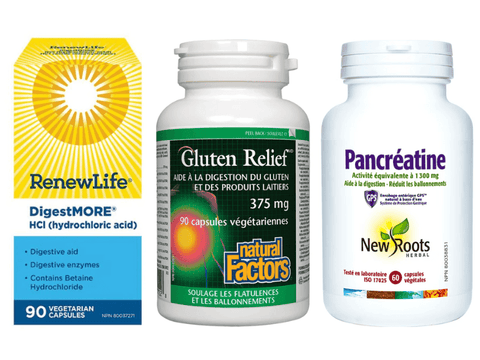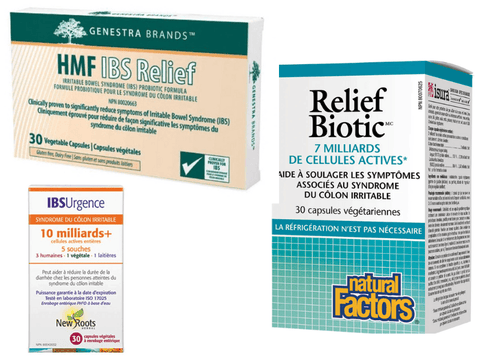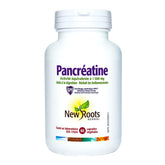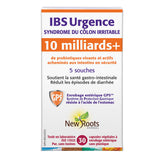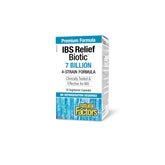Irritable bowel syndrome: what to do and what to eat?
Visit digestive problems are much more common than you might think. Even people who suffer from them are sometimes so "used to it" that they don't really notice it anymore, unless they're going through a more serious crisis than usual.
Episodes of crisis are a reason to consult a doctor. Many people, in their search for causes, end up with a diagnosis of irritable bowel syndrome (IBS). In fact, 50% of gastroenterology consultations are associated with irritable bowel syndrome.4, 5
Let's explore this complex and very common intestinal dynamic.
What is irritable bowel syndrome?
Irritable bowel syndrome (IBS) is characterized by an abnormality of the colon's motricity.5 Either decreased, increased or an alternation of the two. Intestinal sensitivity is increased, leading to spasms or cramps in the various intestinal muscles, often resulting in pain and uncomfortable stools (too hard or too soft, depending on the reactivity of the intestine), often with incomplete evacuation.1, 3, 5 Intestinal spasms are often exacerbated by stress, and relieved by the expulsion of gas or stool.1
The pathophysiological mechanisms of irritable bowel are something of a medical mystery.1
By definition, a syndrome such as irritable bowel syndrome is a diagnosis by elimination. That is, it will be assigned once all the digestive tests have been carried out, without the discovery of any pathology.1, 5 And if the patient meets various criteria such as:
- Gas, bloating
- Abdominal pain
- Diarrhea
- Constipation
- Alternating diarrhea and constipation1, 3, 5
Since IBS is not strictly speaking a pathology, it qualifies as a functional disorder rather than a lesional disorder.1, 4, 5 This, in itself, is excellent news for people with this diagnosis.
Please note: The aim here is not to diagnose yourself, but simply to help you understand the dynamics of ICS. Always refer to your doctor for a valid diagnosis.
Digestive imbalances
Dr. Seignalet explains that the digestive tract is inflamed, and that spasms and motor abnormalities are a consequence of this inflammation.5
In fact, in a global and causal perception, we must consider the following points:
- Enzymatic capacity: especially stomach chloridric acid and pancreatic enzyme capacity.
- The intestinal microbiome +++ (see section on the gut-brain axis).
- Quality of ingested water
- Stress
- Repressed emotions
- Nutritional deficiencies
- Food intolerances
- Irritation/inflammation of the intestinal wall or the notorious intestinal porosity
Because they can cause intestinal inflammation.1, 2, 4, 5
What's more, they're all interrelated.
Gut microbiota and the gut-brain axis
Interestingly, people with IBS also tend to have nervous system imbalances, such as stress, anxiety and depressive symptoms.3
As described by Dr. David Perlmutter in his book "Gut to Brain". there is a close link between nervous health and microbiome balance. One influences the other directly via the vagus nerve. According to him "brain health begins in the gut". but "it works both ways".. So we can take care of our gut by taking care of our thoughts and psychological stress, in addition to taking care of our mental/nervous health with the right diet and supplements.2
According to the doctor Perlmutterthere are 3 sworn enemies of the microbiota:
- Substances that kill good bacteria, such as drugs, antibiotics and laxatives; water treatment agents, chlorine and chemicals; and certain food ingredients, such as gluten and sugar.
- Lack of food and nutrients capable of maintaining the mucosa in optimal condition.
- Stress, which directly affects the quality of the microbiome and digestive mucosa.2
Stress management
Here, we explore whether stress is a causal or aggravating factor in IBS.
This is often difficult to establish, but in general, relaxation and stress management activities are likely to help many inflammatory imbalances via the gut-brain axis.1, 2, 3, 4, 5
Managing emotions is also very important.2
- Reading
- Forest walks
- Meditation
- Yoga
- Creative drawing
- Mandala coloring
- Evenings out with family and friends, laughing and having fun
They're all part of a few ideas that we often take too little time for in our performance-driven world.
Let's never forget that stress is not always physiological, but can also be physical, chemical or dietary!
What kind of diet?
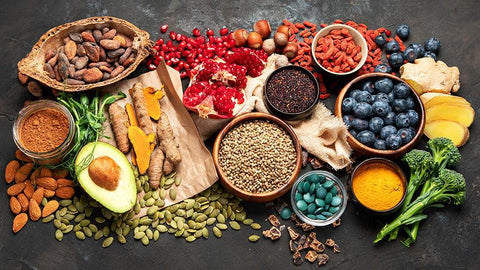
In the presence of irritable bowel syndrome, we need to ensure that our diet reduces inflammation and ensures optimal digestion, micronutrition and microbial balance. The aim is firstly to do no harm, if we are to avoid over-reaction of the intestinal muscles. And, if necessary, to reduce inflammation and optimize the quality of intestinal bacteria.
A common suggestion is to eat mainly cooked foods.5 Pre-digesting" food by cooking seems to be less irritating on intestinal motility. This type of diet seems to relieve symptoms, which for many is good enough! On the other hand, a more cooked diet does not solve the problem in the long term.5
The hypotoxic diet
On the other hand, the hypotoxic diet, which consists mainly of raw foods, shows quite eloquent results. In fact, of the 237 study participants who adopted Dr. Seignalet's hypotoxic diet, 233 achieved complete remission within just one month!5 It's important to distinguish between remission and cure.5
It's therefore a good idea to remove most irritating foods, such as gluten, dairy products, sugar and industrial foods, and to give preference to raw foods or gentle cooking in accordance with the hypotonic diet.1, 5
All the details on the hypotonic diet in this other article.
What natural foods?
Prebiotic foods and intestinal flora
Prebiotic foods are, by definition, non-digestible dietary fibers that contribute to the balance of good intestinal bacteria.1 In a way, they are food for good bacteria. You'll need to be careful at first, as their laxative activity may or may not be desirable, depending on the case.1
Here are a few common ones: asparagus, medicinal champions, garlic, onions, leeks, chicory, Jerusalem artichokes, dandelion leaves.1, 2, 4
Fermented foods such as sauerkraut, kimchi, tempeh, kombucha and kefir are extremely interesting for the intestinal microbiota, as they contain bacteria that can nourish the intestinal flora.1, 2
Dr. Perlmutter also recommends a diet low in carbohydrates and rich in healthy fats, as well as the systematic filtration of tap water that is purified with chlorine, which also risks altering our precious good bacteria.1
Physical activity
Moving, breathing, toning and good posture are also part of the habits to be developed for good intestinal health.4
Physical activity is also an excellent way to manage stress.
Digestive enzymes
In my opinion, in most cases of IBS, the first thing to think about is including a digestive enzyme supplement.
The enzymes that are naturally secreted by our digestive tract can easily be altered and diminished by stress, lack of mastication, ageing or lack of micronutrition etc.
Here are a few examples of enzymes of interest to people living with IBS.
- DigestMore HCI from Renew Life especially if digestion is slow
- Gluten Relief by Natural Factors if there is a tendency to food intolerance.
- Pancreatin from New Roots Herbal if digestion is rapid
Probiotics
IF you've made it this far in the article, you've probably realized that intestinal bacteria are very important.
At the same time, it's important to understand that taking probiotics, without dietary changes, lifestyle modifications and/or enzyme boosting, is not a panacea for IBS or other digestive problems.1, 4
What's more, studies are inconclusive as to whether or not changing the microbiome by taking probiotics is possible over the long term.1 Dosage studies vary between 2 and 30 million.1 High initial doses may cause discomfort, so progressive dosing is recommended. (1)
I think probiotics are a good idea, but they should be taken as a follow-up to enzymes, dietary changes and stress management.
Perhaps this is the way to bring about a real change in the microbiota?
Interesting choices that have been the subject of clinical studies include :
- HMF IBS Relief from Genestra Brands has clinical studies on IBS, and is a probiotic with 25 billion bacteria per capsule.
- Relief Biotic from Natural Factors
- IBS Emergency Irritable bowel syndrome by New Roots Herbal
GABA
GABA is an amino acid produced by the microflora of the intestine, acting as a calming neurotransmitter in the brain. Its presence in the intestine reduces nervous activity by neutralizing brain waves, via the vagus nerve.2 The vagus nerve is the nerve that connects the intestine to the brain.
When taken as a supplement, it binds to intestinal receptors, as if produced in the gut. Eventually, it will be broken down by normal intestinal mechanisms and eliminated through natural channels.
It may therefore be an interesting starting point for people with anxiety and IBS problems, who consider stress and anxiety to be at the heart of their problem.
In conclusion
By now, you'll have understood that irritable bowel syndrome isn't simpler because it's a functional digestive disorder rather than a lesional disease.5
In all cases, it remains essential to address stress management, physical activity and diet first. Then it's time to choose the most appropriate supplements for each case, including a digestive enzyme and, a little later, a probiotic with bacteria studied for IBS. The ultimate goal is to reduce inflammation and restore harmony within the intestinal bacteria.
We could also have elaborated on the use of essential oils for IBS. Indeed, essential oils would be very interesting since they can act on the nervous system, digestion and microbiota at the same time.4
About the author
Marie-France Trudelle, Certified Naturopath
In-depth knowledge of :
- Nutrition and food supplements
- Stress management and sleep
- Physical activity and movement
- Massage therapy
References
- Dr Médart, Jacques, When the gut says noThierry souccar, 2008, 193 pages.
- Perlmutter, David Dr, Gut to BrainOriginal version: Brain maker, Hachette livre (Marabout) 2016, 415 pages.
- Cousin, Marie, ND.A., Therapeutic synthesis, Irritable bowel syndrome2019, 46 pages
- Dr. Scimeca, Daniel, Dr. Tétau, Max, Intestines and stomach aches127 pages.
- Seignalet, Jean, L’alimentation ou la troisièmedecineÉditions du Rocher, France, 2014, 770 p.



